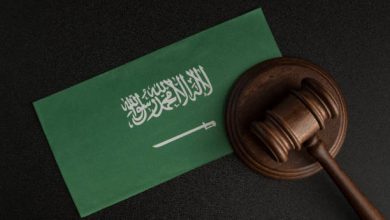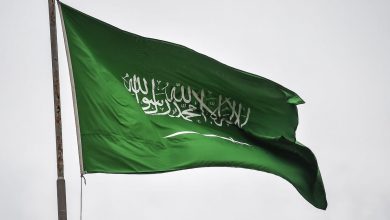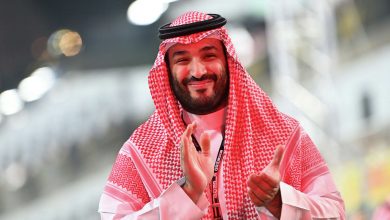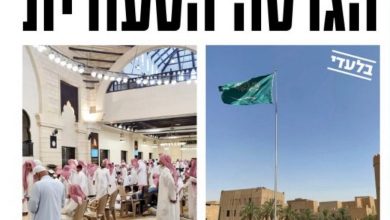Revealing the identity of MBS’s financial arm in Saudi
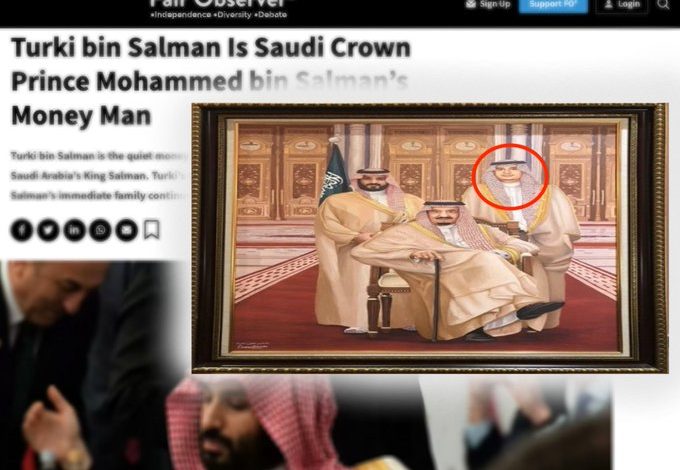
The Fair Observer website revealed the identity of the main financial arm of Crown Prince Mohammed bin Salman and the candidate to succeed him in the position if he assumes the throne.
The website said that the man responsible for managing Mohammed bin Salman’s money is his brother Turki bin Salman. The latter is considered a quiet money man and an advisor in the family business of King Salman.
He stated that a new prominent mural was revealed inside Al-Yamamah Palace in Riyadh – the seat of the Saudi Royal Court – showing King Salman bin Abdulaziz Al Saud in the centre, Mohammed bin Salman on his right, and the lesser-known Prince Turki bin Salman on his left.
Inside the kingdom, the mural has sparked controversy over the most likely line of succession in the event of the death of the 86-year-old king.
The site indicated that there are suggestions that the “future king”, Mohammed bin Salman, may be willing (or perhaps asked by his parents) to appoint Turki as his successor.
He noted that on paper, such a scenario would not be particularly implausible, not even controversial, because MBS’s sons are too young to play such a role.
The site noted that after Mohammed bin Salman, Turki was the eldest of the sons of Fahda bint Falah al-Hathlin, King Salman’s third prominent wife.
This speculation about who the likely Saudi crown prince is is futile, the US website said, noting that the “corrupt” Mohammed bin Salman may increasingly delay the appointment of his successor. He can play the waiting game until he becomes strong enough to make one of his sons crown prince.
The site noted that to achieve this, Bin Salman will take another paper from the book of Mohammed bin Zayed Al Nahyan, where everyone is waiting until Mohammed bin Zayed appoints his favourite son Khaled as his successor.
The mural may be better understood as another layer of evidence indicating that it is, in fact, Turki, and not any of Fahda’s ostensibly prominent sons, who has emerged as MBS’ right-hand man.
He pointed out that Fahda’s eldest son, Khalid bin Salman, became the deputy defence minister after serving as the United States ambassador.
He also clarified that the fourth eldest of them is Bandar bin Salman. The latter is the commander of the royal bodyguard and is responsible for the personal security of both King Salman and Mohammed bin Salman.
Unlike his brothers, Turki appears to have quietly taken control of the family’s private fortunes. It has also been discreetly positioned as one of the kingdom’s most important interlocutors with foreign investors.
Turki had already taken over the management of King Salman’s personal real estate portfolio, acting as a guarantor and liaison with several entities that own King Salman’s various properties abroad.
He also worked for a short period as the head of the Saudi Research and Media Group before being directed by Mohammed bin Salman to take over the presidency of the fortunes, which are personal treasures for the family in 2015.
The website pointed out that although the Al-Tharawat Company was established in 2008, it gained importance in January 2016 as part of Mohammed bin Salman’s master plan to diversify income in the post-oil phase, where this master plan is known as the National Transformation Program and was part of From the famous Saudi Vision 2030.
Significantly, the national program focused heavily on supporting private sector growth in strategic areas.
The National Transformation Program aims to increase the share of the private sector in GDP from 40 to 65%.
In this context, Turki’s rapidly expanding fortunes are increasingly referred to in Saudi Arabia as a “conglomerate” and were initially compared to some of the largest Gulf family-owned businesses in Dubai and Bahrain.
The fortunes have invested in several local real estate, construction, agricultural, medical and information technology projects and have also been linked to a series of controversial Saudi aviation industry investments.
In 2014, the Saudi wealth fund had already acquired a majority stake in a small Dubai-based bank, with Turki taking over as chairman of that bank. He then acted as one of two underwriting agents for a new Sharia-compliant aircraft leasing fund.
According to the site, the financial dealings with Turki and the vast fortunes are complex.
It pointed out that comparing them to family-owned business conglomerates is misleading, so savvy observers, inside and outside Saudi Arabia, have begun to compare the fortunes of the Bahraini Premier Group, which is owned by Bahrain’s royal court and is understood to be managing King Hamad bin Isa Al Khalifa’s private domestic and international investments.
They also draw comparisons to the royal group in Abu Dhabi, which some view under the leadership of Tahnoon bin Zayed Al Nahyan, as representing the private business interests of Mohammed bin Zayed and his other full brothers.
The site concluded that the activities of wealth in Saudi Arabia reveal that Turki has emerged as a man of his family’s money and occupies second place in power after Mohammed bin Salman.

